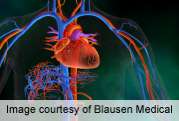(HealthDay)—Among survivors of acute myocardial infarction (MI), nocturnal respiratory rate (NRR) is significantly associated with cardiac mortality, particularly non-sudden cardiac death, according to research published online March 5 in the Journal of the American College of Cardiology.
Michael Dommasch, M.D., of the Medizinische Klinik der Technischen Universität München, and colleagues applied an algorithm to data from Holter electrocardiographic recordings for 1,538 MI survivors to determine NRR. The researchers examined the association between NRR and cardiac death.
The researchers found that NRR was 18.6 per minute or greater in 384 patients and less than 18.6 per minute in 1,154 patients; five-year cardiac mortality in these groups was 13.7 and 3.3 percent, respectively (P < 0.001). NRR of 18.6 per minute or greater was significantly associated with non-sudden cardiac death (hazard ratio, 4.56; 95 percent confidence interval, 2.21 to 9.43; P < 0.001). Among 155 patients with left ventricular ejection fraction of 35 percent or less, NRR of 18.6 per minute or greater was significantly associated with cardiac mortality (P < 0.001) and non-sudden cardiac death (P = 0.009), but not sudden cardiac death (P = 0.595).
"Among patients with left ventricular ejection fraction ≤35 percent, i.e., implantable cardioverter defibrillator (ICD) candidates, increased NRR identifies a group of patients with frequent non-sudden cardiac death, i.e., a mode of death likely not ICD preventable," the authors write. "Independent validation of this new risk stratification approach is necessary before it can be incorporated into clinical decision-making."
More information: Full Text (subscription or payment may be required)
Journal information: Journal of the American College of Cardiology
Copyright © 2014 HealthDay. All rights reserved.





















